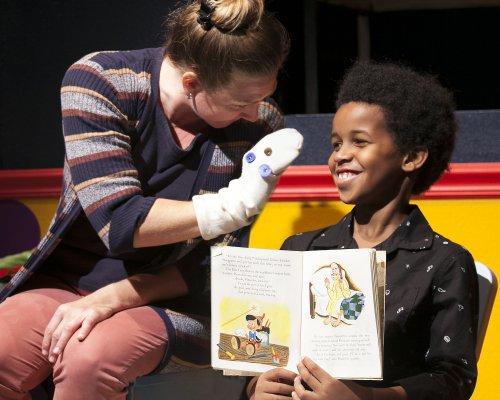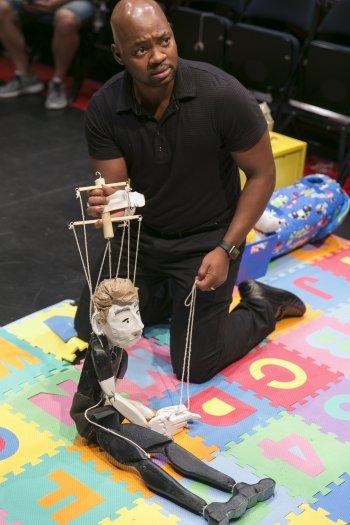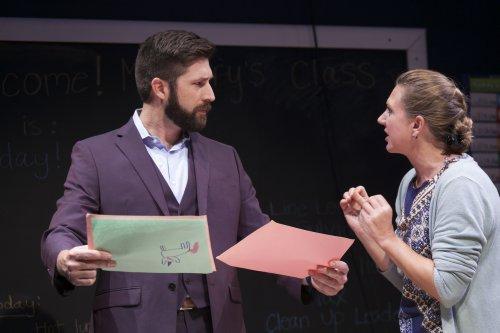A Real Boy
A metaphor, the play comes to be about the political and social issues that envelop non-traditional families such as when a gay couple adopts a child.

Jenn Remke as Terry and Alexander Bello as Max in a scene from “A Real Boy” (Photo credit: Heidi Bohnenkamp)
[avatar user=”David Kaufman” size=”96″ align=”left”] David Kaufman, Critic[/avatar]With a petite table-and-chairs, toys, crayons, and a colorful alphabet as carpeting, the playful and busy set that awaits you when you arrive in the small, black box Theater C space at 59E59 invites you in to the play you’re about to see. But just as you can’t tell a book by its cover, you can’t tell a play by its set.
Stephen Kaplan’s A Real Boy is about a pair of puppets, named Peter and Mary Ann Myers, who adopt the eponymous child named Max, and it proves about as preposterous as such a premise suggests. It isn’t helped by director Audrey Alford’s often awkward staging, or by a muddled and confusing conclusion.
A Real Boy begins with Max’s kindergarten teacher, Terry, complaining to the school principal about Max’s drawings, which have no color: they’re black-and-white: “There is no color in this child’s life,” says Terry, and “His parents have not provided him with a full set of crayons.”

Brian Michael as Max’s father Peter in a a scene from “A Real Boy” (Photo credit: Heidi Bohnenkamp)
This may be intended as a metaphor for something else, just as the play itself comes to be about the political and social issues that envelop non-traditional families, such as when a gay couple adopts a child. Indeed, a note in the script claims that while the puppets are “a typical, suburban, white family,” the puppeteers “should be anything but … They can be other ethnicities, mixed race, the same sex.” Mary Ann is, in fact, manipulated by Jason Allan Kennedy George, who proves rather pretty with some garish lipstick and eye makeup.
When we meet Max’s puppet-parents, they also prove to be black-and-white and, apart from the light beige tint to their hair, without any color. As Terry tells them, “I didn’t even know that the two of you were [puppets] until you came in,” but then, she treats them as real people, at first, adding, “I have many good friends that are puppets.” And as Peter, the paternal puppet, says, “All puppets are different.” Though the moral may be that “puppets” are people too, Terry quickly becomes exasperated with the situation. While feeling that Max is “lost in a world without color,” she also feels that it’s her “job” to “show him himself.”
It’s telling that Terry reads Pinocchio to her students, since A Real Boy is virtually Pinocchio in reverse.

Jamie Geiger as Principal Klaus and Jenn Remke as Terry in a scene from “A Real Boy” (Photo credit: Heidi Bohnenkamp)
As the plot develops, we’re shuttled back and forth between Terry’s classroom and the Myers’ kitchen and dining room–decked out with tiny furnishings, of course, on a platform in the rear of the stage space. But just before the first act curtain, so to speak, the controlling Terry says, “Max will not be leaving my classroom.” This is after Max has started developing strings on his hands, and Terry claims his parents are “abusing” him by turning him into a puppet.
If the play essentially becomes a fight between the teacher and the paternal puppet over control of Max, the absurd situation becomes more so in the second act, when we meet Senator Rebecca Landel–who takes Terry’s side–and Jilly Lambert, a “family friend” of the Myers, who takes Peter’s side. (Max’s mother and the principal remain somewhere in the middle.)
Both Kennedy George as Mary Ann’s puppeteer and Jamie Geiger as the Principal do well with the difficult job of portraying their characters’ ambivalence. Danie Steel is a sassy Rebecca, Katie Braden is a fine Jilly, as are Jenn Remke as Terry and Brian Michael as the manipulator of the paternal puppet. Alexander Bello as one of the two alternating young actors playing Max proved muffled and difficult to understand. While the production’s greatest asset is the set designed by Ann Beyersdorfer, other elements are lacking in style or flair. There’s little to be said about the costumes by Tristan Raines or the sound design by Megan Culley.
A Real Boy (through August 27, 2017)
Ivy Theatre Company in association with Athena Theatre
59E59 Theaters, 59 East 59th Street, in Manhattan
For tickets, call 212-279-4200 or visit http://www.59e59.org
Running time: 100 minutes with an intermission






Leave a comment